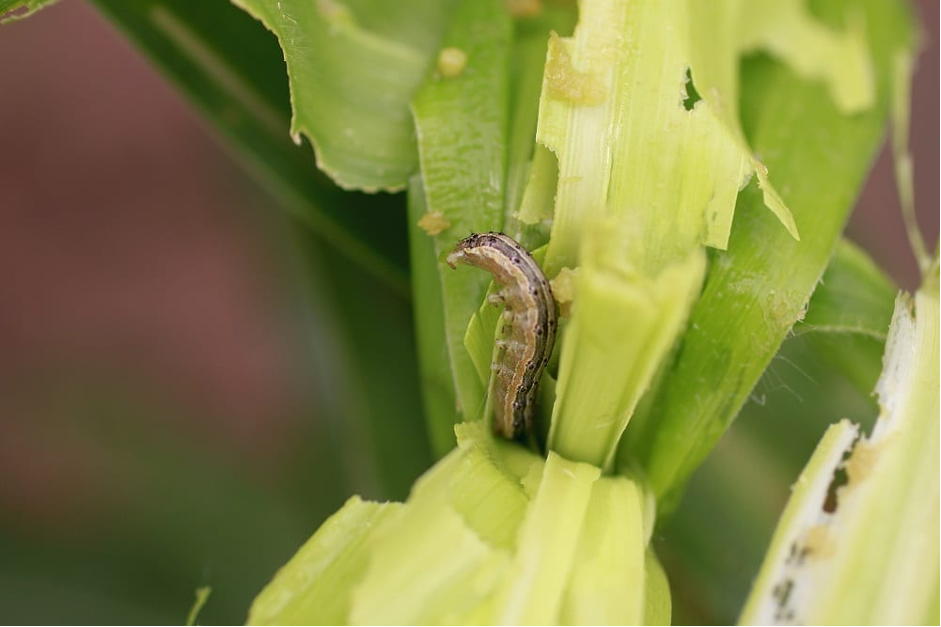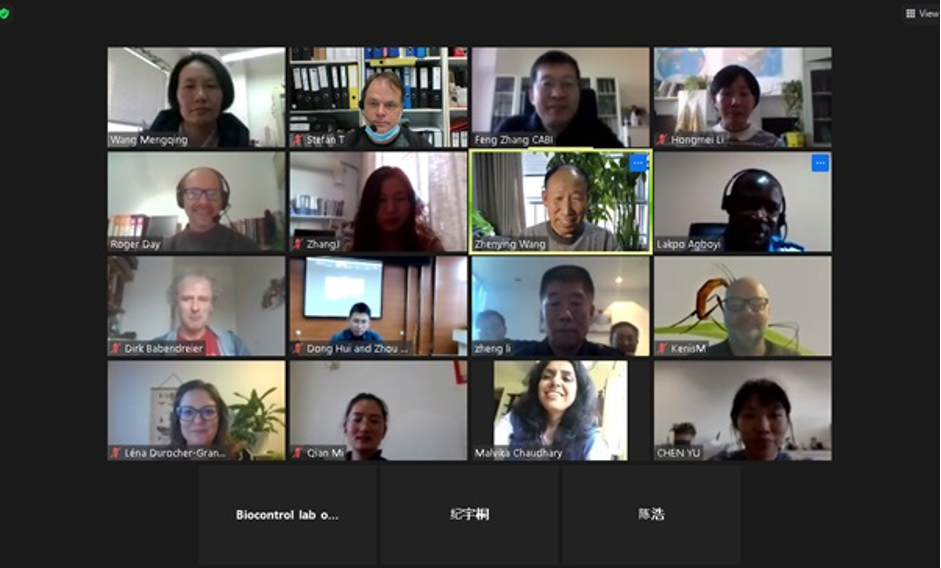
Scientists representing the MARA China-CABI Joint Laboratory for Biosafety and MARA China-CABI European Laboratory have convened to discuss the very latest research efforts in a bid to find sustainable and effective natural enemies to fight the devastating Fall armyworm (Spodoptera frugiperda).
The researchers met via Zoom to update each other on research aimed at collecting and evaluating natural enemies for the Fall armyworm as well as the artificial rearing technology and control effects of these insects – of which more than 250 species have been reported in nearly 10,000 scientific papers since 1910.
The scientists heard how 70 natural enemies of the Fall armyworm have been identified in China including 44 predators such as Pentatomidae, Lygaeidae, Anthocoridae, Nabidae, Coccinellidae, Reduviidae, Chrysopidae, Forficulidae, Formicidae and Vespidae species. Bugs and beetles constitute 68% of the predators.
Dr Mengqing Wang of the Institute of Plant Protection (IPP), Chinese Academy of Agricultural Sciences (CAAS), reported that the predatory bug Arma chinensis has had a ‘remarkable’ control effect on S. frugiperda larva. Breeding facilities to mass produce the bug have been established in Guizhou province so it can be used as a natural enemy to not only control the Fall armyworm but also other pests such as Oriental tobacco budworm (Helicoverpa assulta) and the cotton worm (Prodenia litura). In total, production at the breeding facilities is currently at 70 million individuals per year, covering over 90,000 hectares of crops.

Dr Marc Kenis, Head of Risk Analysis and Invasion Ecology based at CABI’s Swiss Centre in Delémont, highlighted the potential for classical biological control of the Fall armyworm in Asia and Africa using parasitoids from America.
While Dr Kenis said that the classical biocontrol of the Fall armyworm is ‘not easy’, he did say that the pest has many natural enemies in America – including two parasitoids (Eiphosoma laphygmae and Chelonus insularis) which are currently being reared and evaluated in Switzerland. Shipments to quarantine facilities in Africa and Asia for further studies are in progress.
Prof Li Zheng of the Institute of Plant Protection (IPP), Shandong Academy of Agricultural Sciences (SAAS), spoke about the mass rearing and field release of Trichogramma wasps in the fight against the Fall armyworm. Here he highlighted how Trichogramma have been used widely in the biological control of Lepidopteran pests in more than 50 countries (including Brazil, Nicaragua and other South American countries) as part of commercial releases in 32 million hectares of crop every year.
In other contributions to the webinar, Léna Durocher-Granger, Research and Programme Assistant at CABI, talked about her work on conservation biocontrol of Fall armyworm in Zambia, while Dr Jin-Cheng Zhou and Professor Hui Dong, Shenyang Agricultural University, updated on the control efficacy of candidate egg parasitoids against the pest in China.
Dr Lakpo Koku Agboyi, Project Manager, Invasive Species Management, based at CABI’s Centre in Ghana, spoke about the advantages and challenges of the biocontrol of the Fall armyworm in Ghana, and progress with rearing the egg parasitoid Telenomus remus for augmentative control.
Finally, Professor Zhenying Wang, IPP-CAAS, talked about the survey and identification of natural enemies of the Fall armyworm in China.
In closing the webinar, CABI’s Dr Roger Day, Programme Executive, Action on Invasives, said, “The webinar was a great way for CABI and MARA researchers working across the China and European Joint Laboratories to share the very latest scientific understanding of approaches to biocontrol of Fall armyworm in Asia, Africa and other parts of the world. We look forward to opportunities for further scientific collaboration in addressing this serious pest, that will benefit CABI’s Member Countries and the global scientific community.”
Additional information
Main image: The Fall armyworm (Credit: CABI)
Find out more about the Fall armyworm from the Fall armyworm Research Collaboration Portal and the Fall armyworm Information Portal.
Related News & Blogs
Biological control in action: Zambia’s field days on fighting fall armyworm
Experts from CABI recently held two field days and an expo in Zambia, showcasing innovative approaches to pest management to 584 farmers, agro-dealers and other stakeholders to help raise awareness of approaches to tackle the invasive fall armyworm (Sp…
11 June 2025




